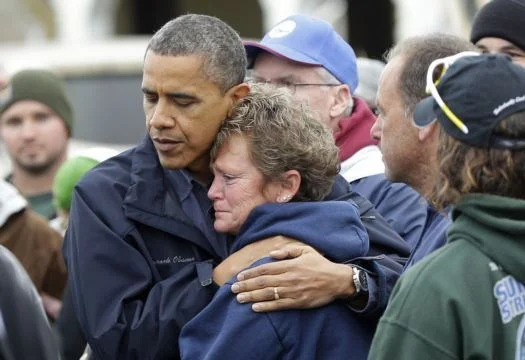Jonathan Chiat at New York Magazine wrote an essay last week entitled Barack Obama is a Great President. Yes, Great. Some excerpts:
For anybody who voted for Obama in 2008 and had even the vaguest sense of his platform, the notion that he has fallen short of some plausible performance threshold seems to me unfathomable.
Obama’s résumé of accomplishments is broad and deep, running the gamut from economic to social to foreign policy. The general thrust of his reforms, especially in economic policy, has been a combination of politically radical and ideologically moderate. The combination has confused liberals into thinking of Obamaism as a series of sad half-measures, and conservatives to deem it socialism, but the truth is neither. Obama’s agenda has generally hewed to the consensus of mainstream economists and policy experts. What makes the agenda radical is that, historically, vast realms of policy had been shaped by special interests for their own benefit. Plans to rationalize those things, to write laws that make sense, molder on think-tank shelves for years, even generations. They are often boring. But then Obama, in a frenetic burst of activity, made many of them happen all at once.
Obama can boast a record of accomplishment that bests any president since Roosevelt, and has fewer demerits on his record than any of them, including Roosevelt.
What can be said without equivocation is that Obama has proven himself morally, intellectually, temperamentally, and strategically. In my lifetime, or my parents’, he is easily the best president. On his own terms, and not merely as a contrast to an unacceptable alternative, he overwhelmingly deserves reelection."
What about the issues? In endorsing President Obama, a newspaper I'm proud to have written for, the Pittsburgh Post-Gazette wrote this:
Every election is meaningful. But some, like Tuesday's, are pivotal. The choice between Barack Obama and Mitt Romney could not be more clear. Each man, as president in the next four years, would lead the country to a vastly different place.
Saddled from day one with the largest economic calamity the United States has seen since the Great Depression, Mr. Obama worked to stimulate jobs and business, stabilize a teetering banking system, calm a housing market in free fall and save a large chunk of the economy by way of the auto industry.
Along the way, he inaugurated a comprehensive health insurance overhaul that had eluded presidents of both parties and that now guarantees coverage for tens of millions who once fell through the cracks. He also accomplished a sweeping reform of financial regulations to prevent what happened in 2008 and reduce the vulnerability of average savers and investors to the risky gambits of high-flying market manipulators.
The choice is clear. Barack Obama wants to lead the country out of its morass and deserves the support of all Americans. His challenger is a man of shifting convictions, save for one core belief -- that he should be president. In America that's not enough, no matter the size of one's checkbook."
E.J. Dionne began his endorsement in TIME magazine by describing the America that President Obama represents, as opposed to Romney's.
If Obama wins, he will owe his re-election to a little bit of all of us: blue-collar white voters in the Midwest, upscale voters in the Northeast and on the West Coast, an overwhelming percentage of Latino voters turned off by a new nativism on the right, and near unanimous solidarity on his behalf among African Americans. Obama is not the sort to think about dismissing 47% of us.
Romney's crowds and Romney's support is nearly all white. The intensity and delusionary quality of the hatred of Obama among them points to ideological zealotry mated with racism. It drips from Romney himself, who also makes it a class reaction. It reminds me of a point made by Toure and Andrew Sullivan that the real test of the state of racism in America wasn't the election of a black President, but the re-election. As Sullivan noted, some people were willing to elect a black President, but not prepared to be governed by one.
Dionne goes on to discuss policy:
Most relevant to this year’s choice is the fact that the economy is in far better shape than it would have been if we had followed the counsel of Obama’s foes. They would have allowed the auto industry to collapse. They would have ignored history’s lesson that government must step in to stimulate economic activity when private demand plummets. We know from the experience of Europe that austerity leads to stagnation. Obama made the better choice.
Dionne's conclusion is about the same as Chiat's though he says it more delicately.
Obama is battling to defend the long consensus that has guided American
government successfully since the Progressive Era. It is based on the view that
ours is a country whose Constitution begins with the word we, not me, and that
the private success we honor depends on a government that serves a common good
and remembers the most vulnerable among us. The task of our moment is to revive
that long consensus and renew it. Of the two major candidates, only Barack Obama
accepts this mission as his own."













No comments:
Post a Comment